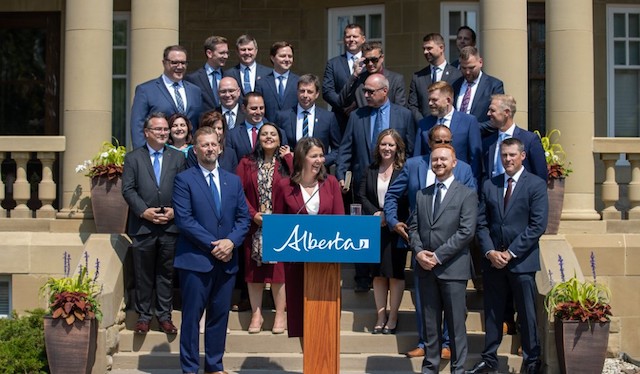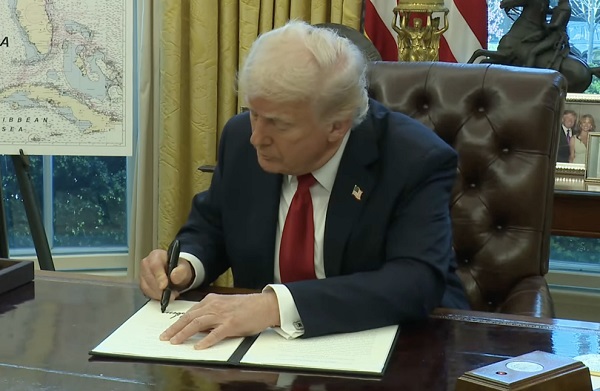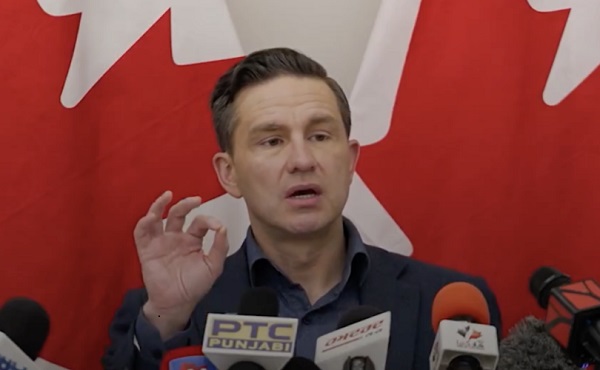Alberta
Ministerial Mandate Letters highlight upcoming showdowns between Alberta and Ottawa

Contributed by Free Alberta Strategy
After every election in Alberta, once the new government is formed and Cabinet has been selected, the Premier provides documents called mandate letters to each of their new Cabinet Ministers. These mandate letters outline the government’s priorities and policy objectives, as well as the Premier’s expectations, for each Minister’s performance in their respective roles. It is also common for these mandate letters to be released publicly, giving us as the public an early look at where the government is likely headed in the coming months and years. Over the last few days, the first of these mandate letters have been released, so we wanted to bring you a few of the highlights.
The constant theme throughout the letters is a very clear message to the federal government that Alberta will be flexing its muscles on the national stage in the coming four years. In particular, the two highest-profile Ministries – namely Finance and Energy – got mandate letters that put the federal government right in their crosshairs.
*****
Drumheller-Stettler MLA Nate Horner is in Cabinet as Finance Minister and has been tasked with looking at the establishment of an Alberta Revenue Agency and an Alberta Pension Plan.
These are both fundamental concepts of the Free Alberta Strategy, and both are strongly opposed by the New Democrats led by Rachel Notley.
The concept of an Alberta Revenue Agency isn’t as scary as most of the opposition is making it out to be.
Quebec already has a Quebec Revenue Agency that collects all provincial tax.
Saskatchewan just passed the Saskatchewan Revenue Agency Act, which gives them the ability to defend Saskatchewan’s economic autonomy, industries and jobs from federal intrusion and constitutional overreach.
Also, Alberta already collects provincial corporate tax through the Tax and Revenue Administration department.
So, in some ways, the Alberta Revenue Agency already exists – we just need to expand its mandate to include other types of taxes other than corporate tax.
This move would also provide greater flexibility for the province when it comes to provincial tax collection policy.
As a bonus, once this is done, we will then be able to join Quebec in lobbying the federal government for the ability of provinces to collect federal taxes.
This is something that Quebec has been pushing for for quite some time, and while they haven’t made any progress in convincing the current federal Liberal Party, several recent Conservative Party leaders have expressed support for the idea.
With regards to an Alberta Pension Plan, there is an actuarial report due to be released sometime soon that has studied this issue.
“It’s something that’s been outlined as a potential opportunity and something that we need to really flesh out and get into the numbers and make sure that Albertans understand,” said Horner.
We’ve pointed out here a few times that Albertans contribute more into the Canada Pension Plan than we take out in benefits.
In essence, Ottawa is using the CPP as just one more way to subsidize the rest of Canada with our money.
We anticipate the report – when it is released – will point out that due to our young demographics and provincial income levels, an Alberta Pension Plan will give us the ability to decrease contributions while maintaining the same benefits to our seniors, keep contribution levels the same while increasing benefits to our seniors, or some combination of the two.
Alberta’s exit from the Canada Pension Plan would also leave a huge hole in the national fund – one that would require premiums to dramatically increase in the rest of the country to make up for the subsidy they’ll no longer be getting from Albertans.
*****
Fort McMurray-Lac La Biche MLA Brian Jean steps into the crucial role of Energy and Minerals, a very fitting role given the riding he represents is the very heartland of the energy industry.
Jean will face off against a federal government that has been violating provincial natural resource jurisdiction ever since its election, and he will be expected to stand up to the politicians in Ottawa who are seeking to systematically decimate our natural resource industry.
Specifically, Jean is tasked with “defending Alberta’s energy interests against federal overreach and developing strategic alliances with other provinces to deal with energy-related issues.”
Recently, Federal Environment Minister Steven Guilbeault has gone so far as to state his belief that oil and gas production is likely to be reduced by 75% by 2050.
And given Justin Trudeau’s plans for a Just Transition / Sustainable Jobs Act, a net-zero electricity grid by 2035, an emissions / production cap on oil and gas at the end of this year, and more, we should believe him when he says he intends to try.
Considering the impact the aggressive climate ambitions of the federal government are anticipated to have on the national economy, prioritizing the defence of the industry on a jurisdictional basis is absolutely essential to ensure the future of Alberta.
*****
Horner, Jean, and the rest of Cabinet are about to become willing participants in the biggest fight of their political lives.
They will be expected to stand up for Alberta against the next wave of federal attacks and wrest control of our future back from Ottawa.
Here at the Free Alberta Strategy, we will be pushing the government to stay resolute in the face of these attacks, and to implement our ideas and proposals.
We’ve seen once before that a government in Alberta can be elected on a strong mandate to stand up to the federal government but back off when left-wing activists and media pressure them to stop.
That’s why we need to keep the pressure on to keep going, and make sure this government follows through.
To help us keep the pressure on, please consider making a donation to the Free Alberta Strategy:
We need your support to continue our research, policy analysis, grassroots organizing, and communications efforts.
Thanks for your support!
Regards,
The Free Alberta Strategy Team
—
DONATE has two key objectives:
- Establishing complete Provincial Legislative Sovereignty within Canada
- Ending Equalization and Net Federal Transfers out of Alberta
The Strategy accomplishes these two objectives through a series of legislative and other policies that must be implemented by Alberta’s Provincial Government
Alberta
Province pumping $100 million into Collegiates and Dual-Credit hands-on learning programs

Alberta’s government is helping students discover their skills and interests today, to help them find careers for tomorrow.
If passed, Budget 2025 will provide more than $100 million over three years for school boards to grow career education programs, including funding for more collegiate and dual-credit programs across Alberta.
“We are working to set students up for success by strengthening job-focused education. This money is helping schools partner with businesses, universities and colleges to create programs that will help students hit the ground running after they graduate.”
Career education helps students gain credits towards graduation while earning hands-on experience in fields like the trades, computer programming, health care, agriculture, culinary arts and more. These career education programs support a strong economy by helping students learn the skills they need to get in-demand jobs.
Collegiate schools
Collegiate schools work with businesses, universities and colleges to offer classes that give students pathways to education and careers in the job of their choice. There are 12 collegiate schools in Alberta, offering many different types of programming for grades 7-12, including aviation, graphic design, trades and more.
If passed, Budget 2025 provides more than $21 million to school boards to help fund special classrooms like carpentry workshops, film and media rooms, science laboratories, heavy equipment simulators and aircraft hangars. Another $6 million is being invested to support the start-up costs for new collegiate schools.
Dual-credit programs
Budget 2025, if passed, also provides $4.6 million in 2025/26 to start new or improve existing dual-credit programs. In partnership with universities and colleges, dual-credit programs give students a head start on rewarding careers by allowing them to earn high-school and post-secondary credits at the same time. Of the $4.6 million, $550,000 is being provided by Alberta Seniors, Community and Social Services for new and improved dual-credit health care aide programs.
“Health care aides play a critical role in ensuring Albertans receive the continuing care services they need to maintain their health, independence and quality of life. Our investments into career pathways for health care aides will provide opportunities for young Albertans to develop the skills they need to build a rewarding career in Alberta’s continuing care workforce.”
Another $1.4 million is being invested to support students participating in off-campus career education programs through CAREERS. This non-profit connects students to jobs in high-demand fields, such as the trades, technology, health, forestry and agriculture.
“Investments in collegiate and dual-credit programming are significant for Calgary Catholic as they further strengthen our collegiate and dual-credit programming. This programming will open opportunities for our students and help them to realize their full potential.”
“Before Fusion Collegiate, I felt lost and wasn’t really sure what to do after high school. Thanks to its career-focused learning and the opportunities through Fusion and The Educational Partnership Foundation, I’m now working as a first-year apprentice plumber with Mr. Rooter. The hands-on trades training, high school credits, safety certifications, and real-world skills I picked up completely changed my life. I’m excited about where my career is headed and really thankful for the support that helped me get here.”
Budget 2025 is meeting the challenge faced by Alberta communities with continued investments in education and health, lower taxes for families and a focus on the economy.
Quick facts
- If passed, Budget 2025 invests $102.4 million over three years to provide sustainable, predictable career education funding, and to increase access to career education for Alberta students.
- This includes $8.4 million over 2026-27 and 2027-28 to raise awareness among students and families of career education programs and pathways available to Alberta students.
- Career education in Alberta includes career and technology courses, Career and Life Management (CALM), dual-credit courses, collegiate schools, apprenticeships and off-campus education programming.
- Since 2013, more than 95,000 high school students participated in at least one dual–credit course.
- In spring 2025, Alberta Education will engage with education partners on best practices to bring more career education opportunities to students.
- Since 2022, education partners and almost 5,000 Albertans have provided their feedback on career education and workforce needs.
Related information
Alberta
Photo radar to be restricted to School, Playground, and Construction Zones as Alberta ends photo radar era

Alberta’s government is fulfilling its promise to end Automated Traffic Enforcement (ATE) in select locations while enhancing safety with a new Traffic Safety Fund.
For years, Alberta has had the most ATE sites of any jurisdiction in Canada with many serving as a “cash cow,” generating millions of dollars in revenue with no clear evidence they were improving traffic safety. Now, following thorough consultation and review of existing ATE sites, Alberta’s government is making significant changes to restore public trust in the use of photo radar.
Effective April 1, the updated ATE Technology Guideline will prohibit photo radar on numbered provincial highways and connectors, restricting it only to school, playground and construction zones. Intersection safety devices in Alberta will also be limited to red light enforcement only, ending the “speed-on-green” ticketing function.
“We have officially killed the photo radar cash cow and the revenue-generating “fishing holes” that made Alberta the biggest user of photo radar in Canada. The updated guideline will ensure that photo radar is used for safety only. The new provincial traffic safety fund will support municipalities in physical improvements at key intersections, helping to reduce traffic risks and enhance safe roads.”
Alberta’s government has also created a new $13-million Traffic Safety Fund for municipalities to upgrade local roads and intersections that pose demonstrated safety risks. Details will be made available on how to apply for the Traffic Safety Fund, once the application process has been finalized.
“This shift ensures that photo radar is used where it matters most – near schools, playgrounds and construction zones. Traffic enforcement should be about protecting people, not generating revenue. The new Traffic Safety Fund gives municipalities the tools to make targeted improvements to roads and intersections with real safety concerns. Keeping Edmontonians safe on our streets must always remain the priority.”
“Shifting photo radar to playgrounds and construction zones enhances safety where it matters most – protecting our children and workers on Calgary’s roads. I’m proud to back this important step toward safer communities.”
“The Traffic Safety Fund is a welcome addition to the overall funding available to municipalities. The Rural Municipalities of Alberta support a dynamic approach to managing traffic safety.”
Municipalities are encouraged to use traffic calming measures instead of photo radar but may request provincial approval for an exemption to the photo radar ban in high-collision locations. To do so, municipalities must submit a business case detailing high-collision frequency and severity at the site, relative to similar locations, and demonstrate how other safety measures are not possible or will be ineffective. To be approved for an exemption, they must also commit to audit the exempted site every two years to assess the effectiveness of photo radar in reducing collisions at that location.
The updated ATE Technology Guideline also includes parameters around equipment testing and maintenance, data collection and reporting requirements, traffic safety plans, signage and public communication of photo radar locations.
Quick facts
- On April 1, the new ATE 2025 Technology Guideline comes into force.
- The newly created Traffic Safety Fund will provide $13 million over three years to help municipalities re-engineer intersections to reduce collisions:
- $1 million in 2025-26
- $2 million in 2026-27
- $10 million in 2027-28
- Alberta first introduced photo radar in 1987.
Related information
-

 2025 Federal Election2 days ago
2025 Federal Election2 days agoPoilievre refuses to bash Trump via trick question, says it’s possible to work with him and be ‘firm’
-

 COVID-192 days ago
COVID-192 days ago17-year-old died after taking COVID shot, but Ontario judge denies his family’s liability claim
-

 Alberta1 day ago
Alberta1 day agoAlberta Institute urging Premier Smith to follow Saskatchewan and drop Industrial Carbon Tax
-

 Business2 days ago
Business2 days agoWhile “Team Canada” attacks Trump for election points, Premier Danielle Smith advocates for future trade relations
-

 Addictions1 day ago
Addictions1 day agoShould fentanyl dealers face manslaughter charges for fatal overdoses?
-

 Alberta1 day ago
Alberta1 day agoAlbertans have contributed $53.6 billion to the retirement of Canadians in other provinces
-

 2025 Federal Election1 day ago
2025 Federal Election1 day agoFool Me Once: The Cost of Carney–Trudeau Tax Games
-

 Automotive2 days ago
Automotive2 days agoTrump announces 25% tariff on foreign automobiles as reciprocal tariffs loom





